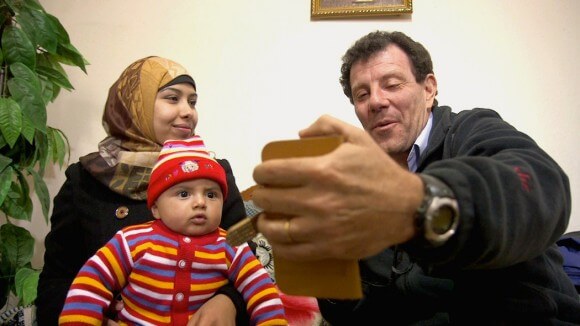‘What should Israel do? Stop committing war crimes’ –Kristof’s bold step in ‘NYT’

As we keep saying, Palestinian solidarity reached a new benchmark in American media/politics during the May assault, and it would be remiss not to laud Nicholas Kristof’s column in the New York Times two days ago, “Were My Criticisms of Israel Fair?” It represents a great new position for a mainstream columnist: Hamas hitting Israel with rockets does not justify Israeli war crimes against Gaza.
Kristof says that after he published two columns critical of Israel and Hamas during the conflict, many readers landed on him, asking, “What would you have Israel do?” This is of course a standard line of defense by the Israel lobby. If rockets were falling on New York from Canada — Americans would retaliate. Etc.
Kristof blows the argument out of the water, saying that this is a political dispute that will not be solved by “war crimes” by Israel and Hamas. He notes that Spain suffered “brutal terrorist attacks for decades from ETA Basque separatists. Spain didn’t send troops to storm the Basque Country, nor did it invade France (which ETA used as a base for terrorism). Instead, it gritted its teeth and granted autonomy to the Basque Country.”
Similarly, the Irish Republican Army, with support from some in Ireland and the United States, bombed Britain’s Parliament, Harrods department store and the Conservative Party Conference, along with innumerable other targets. Yet Prime Minister Margaret Thatcher did not bomb Dublin or Boston, nor did she bulldoze the offices of Sinn Fein, the I.R.A.’s political wing.
He notes that three years ago the Basque separatist organization announced that it was disbanding, adding “we are truly sorry” for violence that claimed 800 lives. “In Northern Ireland, where the conflict initially seemed even more intractable than the disputes in the Middle East do today, a negotiated peace was reached with the Good Friday accords of 1998.”
He concludes by saying that Israel and Hamas should “stop committing war crimes.” That’s the only way to end an intractable problem.
We wish he’d gone further — that he’d described the inhumane conditions imposed on Gaza’s 2 million people, and that he’d described the origins of the Gaza enclave/prison in the ethnic-cleansing period of 1947-49, a history that lives on in the huge number of refugees in Gaza. These people have rights inside Israel that have never been honored.
Still this is a big step forward for a columnist at the newspaper that ran four columns defending Israel’s slaughter of nonviolent Palestinian protesters in Gaza in 2018. Clearly, Kristof is speaking his mind and not stepping back now because the climate has shifted, and he doesn’t think his career is going to go off the cliff if he does express these ideas. Those red lines held for decades till this spring. . . Marc Lamont Hill was fired three years ago by CNN for calling for Palestinian freedom, and Steven Salaita had his academic contract revoked seven years ago for tweeting about Israeli war crimes.
Of course the Israel lobby is still live and kicking. Compare Kristof’s report with the unreconstructed hasbara from Jackie Northam on NPR’s “All Things Considered” on Friday, that described militants’ tunnels in Gaza as an “urgent threat” to Israel.
Northam quotes Israel army mouthpiece Jonathan Conricus describing the tunnels as “the Metro,” and also an Israeli law professor, Daphné Richemond-Barak, saying the tunnels epitomize terror.
I think it epitomizes the meaning of terror and terrorizing the civilian population.
Somehow overlooking the hundreds of Palestinian families terrorized by Israeli violence.
Richemone-Barak goes on:
It’s the great equalizer, so it enables Hamas operatives to operate undetected.
Are these sides “equal”? One is the colonizer, the other the indigenous population. 256 Palestinians were killed in the last conflict, most of them civilians, including many children. Thirteen Israelis were killed, one of them a soldier.
Northam does quote a couple of Palestinians to try to “balance” her report but the thrust of the story was that Hamas is “burrow”-ing into Israel. With no sense of how Gazans are confined and why.
Another step forward in the MSM: David Remnick interviewed Sarah Schulman— “an important figure of queer history”–for the New Yorker Radio Hour yesterday about her new history of the radical origins of ACT-UP during the AIDS crisis, 1987-1993. Schulman praised “Palestine solidarity” work as a radical movement today, and offered wise counsel on how queer activists were able to achieve a “paradigm shift” in American consciousness through the principle of “radical democracy”. Schulman:
The takeaways from ACT-UP are very important for movements today. The most important is that ACT-UP was not a consensus based movement. People did not have to agree in order for actions to go forward. There was a one-line principle of unity, Direct action to end the AIDS crisis. That was as opposed to social service provision. So if you were doing direct action to end the AIDS crisis, you could do it. And if I didn’t like it I might argue with you but I wouldn’t try to stop you from doing it. I just wouldn’t do it and I would go off with my people and organize what we wanted to do. As a result, the wide range of action and different milieus and levels at which ACT UP responded was so broad that it crated a kind of simultaneiety of response, and that was a great contributor to the paradigm shift. I think the big message is, Radical democracy inside your organizations, and big tent politics, and the kind of movements that allows people to respond from where they are at with what makes sense to them.




Geen opmerkingen:
Een reactie posten